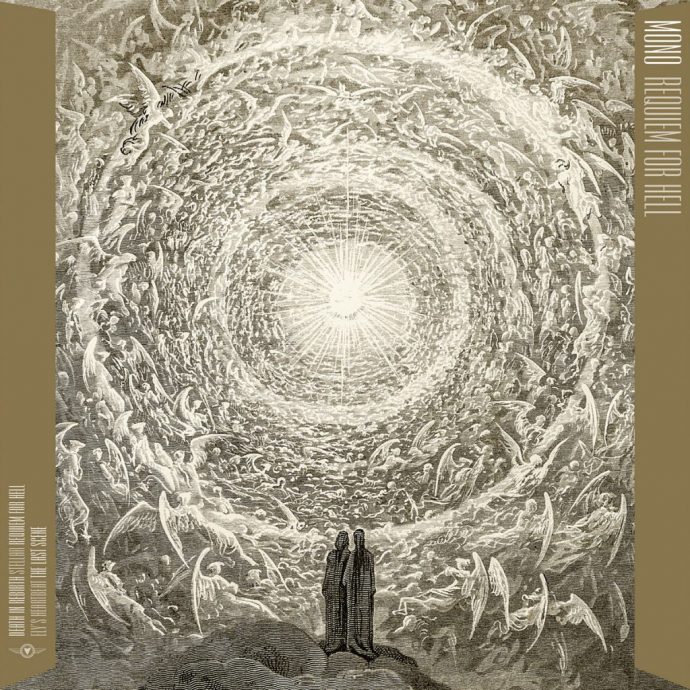Mono, a four piece from Japan specializing in instrumentally piloting emotional sound, releases their 9th studio album Requiem for Hell. The force behind their music is their two guitarists, Taka and Yoda, their bassist Tamaki, and drummer Yasunori. Like many talented instrumental bands, their members are not tied down to one instrument, nor are they tied to traditional methods. Requiem for Hell, along with the rest of their discography, really shows the innovativeness these four withhold for artistic advancement and experimentation. This is not a typical post-rock album; it’s more of a clamorous gesturing of sound through the polarities of the human psyche.
The album invites the listener into Mono’s funerary process of hymnals with “Death in Rebirth.” Throughout the song one can hear the two guitars support each other, then travel away from each other, going in and out of discord and harmony. The drum line marches you along, and the bass line, almost inaudible by all of the distortion and delay, still rings through to shift the mood all across the spectrum. The song lingers out with distortion and feedback – a nice dose of noise. The next track, “Stellar,” brings in bells and strings, keys that bring out phantom instruments, and starts the vacillation of feelings the album puts out.
The title track, an eighteen-minute masterpiece, does justice to show their experience in travelling the emotional soundscape not just as a band, but as artists of being able to portray the visceral interpretation of life itself. It begins calm and sorrowful, then the guitars come in with more severity and a distorted cadence, followed by the drums, and the inkblots of sound begin to take shape and form meaning. The second movement really amplifies their use of heavy noise and discord, somehow being able to pull the two together as a band and have an output disturbing yet beautiful.
The album breaks with “Ely’s Heartbeat” and follows with the end track, “The Last Scene.” At first listen, the song seemed to be all the wrong ways to finish the album, but as it turns out, it might be perfect. The ebb and flow of intensity prior left me hanging on for another heavy noisy and experience, but they must have ended this way for a reason. The song has an aura to it that feels like sailing into the heavens, both a happy and sad experience, yet neither at the same time; mainly just that it’s part of experience itself. It takes you to that place of a final balance in the music and then fades out.
It is a noisy and shoegazy post-rock album, and it is almost over emotional, but Mono pulled it off with a sense of minimalism that really makes the album not overbearing or too messy. Often artists go overboard with detail and it comes out like over-seasoned food. The album never is too much, but definitely takes the listener to their height of tolerance just before dropping them.
Rating: 7.8/10

